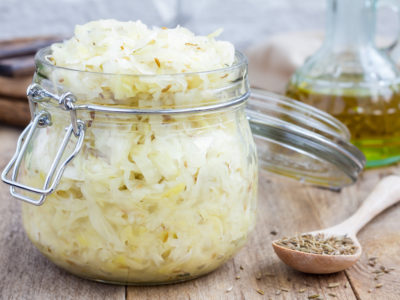Table of Contents[Hide][Show]
As a mother, your child’s well-being is your utmost concern.
Now that your baby is out in the world, all you want is to protect him or her from any possible threats that may wreak havoc on their health.
You’ve probably already disinfected every surface (multiple times over), put child locks on all the cabinets and doors, and baby-proofed all the sharp edges in your house to keep your little one healthy and protected.
But, have you ever considered looking into your baby’s beneficial bacteria (i.e. probiotics)?
Well, you should!
Keep reading to learn about the health-supportive power probiotic bacteria can play in your life and the lives of your little ones as well as what you need to know about probiotics and breastfeeding.
What are Probiotics?
Your body has both good bacteria and bad bacteria that reside naturally within the digestive tract.
Probiotics are good bacteria. They are live microorganisms that support digestive and intestinal health and play an important role in nearly every bodily function.
Studies show that there are multiple health benefits of probiotics. Probiotics can:
- Produce critical nutrients and vitamins the body needs
- Optimize a healthy immune system
- Drive healthy and clear skin
- Improve brain power and mood
- Boost overall health at any age
And from grandmas to newborns, we all need a balance of probiotic bacteria in our bodies to be healthy and strong.
Babies and Probiotics
Just like you, babies need probiotics to be healthy. They receive their beneficial bacteria in 3 different ways—during pregnancy, during vaginal birth, and while breastfeeding.
Probiotics During Pregnancy
During pregnancy, the gut microbiome undergoes changes to help support fetal growth and boost lactation.
However, the balance between the friendly and harmful bacteria in your gut may change (especially during the first trimester) when expecting moms experience symptoms like morning sickness or stomach upset.
Therefore, if you’re expecting, it’s crucial to support a healthy bacterial balance in your body so you’re passing more of the good stuff on to your baby.
Apart from eating more foods rich in natural probiotics and prebiotics, expecting mothers-to-be can take probiotic supplements.
Studies have shown that mothers who supplement with probiotics during pregnancy help boost both their immune system and that of their child.
Related
Prebiotics for a Healthy Gut… and a Healthy You!
Heard about prebiotics but don’t know exactly what they are and what they do in the body? Here’s what you need to know about them, why they are essential to gut health, and how you can easily add them into your daily health regimen.
Probiotics During Vaginal Birth
While we already know that probiotics are crucial for gut health, recent studies have shown that probiotics are also beneficial for vaginal health.
There are over 50 different microbes in the vagina. These tiny organisms help protect the vagina from infections (yeast, urinary, etc).
But, apart from keeping the vagina healthy, the abundance of healthy bacteria in the vagina plays a huge role in the health of your newborn.
During natural childbirth, as the baby passes through the birth canal, the mom’s body transfers healthy bacteria to the newborn.
These probiotics support the natural balance of gut bacteria that help boost your baby’s health from birth onward.
Probiotics and Breastfeeding
After delivery, the main source of healthy bacteria for babies comes from breast milk.
They play a crucial role in the development of a baby’s healthy microbiome and in building your child’s strong immune system. They can also help your baby’s gut health right from the start.
Thus, breastfeeding moms should maintain a healthy gut to provide their child with more probiotics while breastfeeding.
Now, you may be asking…
Can I Take Probiotics While Breastfeeding?
According to the National Center for Biotechnology Information, the use of probiotics while breastfeeding is perfectly safe and healthy. There are no ill side effects for you or your baby if you take probiotics.
Research shows that taking probiotics can also boost the immunoprotective potential of breast milk, meaning it can help strengthen your child’s immune system.
This is the reason why many breastfeeding mothers now incorporate probiotic supplements into their daily regimen.
Benefits of Probiotics for Babies & Moms
There are many benefits of taking probiotics for both moms and babies. Let’s take a closer look at those benefits below.
Probiotics Boost Immunity
Infants are born with a sterile GI system that may be susceptible to infections and bacteria.
By supplementing with probiotics, you increase the number of good bacteria in your body, which you’ll then transfer to your baby through breastfeeding.
As a result, you help your baby build a healthy barrier in their GI tract that supports optimal immune function, and makes them less susceptible to anything that might be going around.
Probiotics Help Prevent & Treat Diaper Rash
Diaper rash is a common condition for babies.
Apart from keeping your baby’s bottom clean, you can also avoid diaper rash by adding probiotics to your diet (and transferring them to your baby via your breast milk.) Some studies even indicate that resilient probiotic supplements can be put directly on the rash.
The good bacteria in probiotics help to decrease diaper dermatitis lesions. This is supported by a study that suggests that probiotic supplementation may be useful in the treatment and prevention of diaper dermatitis.
Probiotics Decrease Susceptibility of Colic
Colic in babies is caused by taking in too much air while breastfeeding. This can make the baby fussy and irritable.
However, a study by Italian researchers showed that administering five drops of probiotic in the first 3 months after birth helped the babies in the study maintain healthy digestion. Thus, it minimizes the chance of your baby getting colic.
Probiotics Prevent Thrush
Thrush is a yeast infection that often grows around the baby’s mouth and tongue, or on the mother’s nipples.
It typically occurs within the first year of birth, and though uncomfortable, it is not something that is cause for alarm.
If you want to minimize the chances of you or your baby getting thrush, then taking probiotics can help.
A 2012 study published in the Journal Of Archives Of Gynecology And Obstetrics showed that pregnant women who took probiotics saw a decrease in yeast levels in their bodies, allowing them to pass more beneficial bacteria to their breastfed babies.
Some practitioners also recommend applying probiotic powder directly to the mother’s nipples. It’s also advisable to put probiotic powder inside the baby’s cheeks where thrush is present.
If you don’t want to rely solely on supplements to support your gut health, you can add probiotic-rich foods to your diet. There are a lot of benefits for moms in eating probiotic sources. They include reducing bloating, constipation, and acid reflux. There are also specific benefits in each food source.
Below is a list of healthy foods with naturally occurring probiotics.
6 Probiotic-Rich Foods for Breastfeeding Moms and Moms-to-be
Dark Chocolate
Dark chocolate is a good source of probiotic lactobacillus plantarum. If you’re craving some sweet treats, then dark chocolate is a good choice. It is rich in antioxidants, with anti-inflammatory properties, plus it also contains prebiotics!
Kimchi
Kimchi is a fermented food that is shown to stabilize digestive enzyme patterns and create microbe balance in the gut.
Kombucha Tea
Kombucha is a fermented tea that is shown by studies to help optimize your immune system, digestion, and heart health.
Kefir
Kefir is another fermented food that has great antioxidant properties, which are important for the health of newborns. It contains up to 61 strains of yeast and bacteria that help in weight loss and digestive health.
Pickles
Pickles support healthy levels of salmonella in the body, which is beneficial for boosting gut health.
Sauerkraut
Eating this probiotic source every few days, or just whenever you have an upset stomach, can help with ulcerative colitis and irritable bowel syndrome (IBS). The probiotics in sauerkraut can also help treat eczema.
Related
Healing The Gut With Sauerkraut (Easy-To-Follow Recipe)
If you want to keep your gut healthy, it’s time to look into the benefits of sauerkraut. To make sure you consume only the best sauerkraut, learn how to make your own here!
Eating a diet rich in gut-healthy foods is always a good idea. However, supplementing with the right probiotics can support a healthy gut far better and faster than diet alone.
If you do opt to boost your beneficial bacteria by supplementing, it’s highly recommended that you only buy probiotic supplements from trusted sellers.
How Do You Choose the Best Probiotic?
With hundreds of probiotic options, all with different combinations, dosages, and strains, how can you know which one is “good” for you and your baby?
Below are 3 crucial criteria to consider when choosing your probiotics.
Both the Ingredients and the Label Should Match
A study published in the Journal of Pediatric Research shows that out of 16 Bifidobacteria probiotic products, only one delivers its promise on the label.
The remaining 15 products had had probiotic strains not listed on the label. That means neither you nor the manufacturer knows what you’re putting in your body or how it will impact you…
It’s important that you do your due diligence when buying your probiotic as you may not be getting what you have paid for.
It Should Survive and Thrive in the Gut
The human digestive system is designed full of hazards to help kill harmful microbes and break down foods.
Fortunately, high-quality probiotics can survive and pass through digestive enzymes and stomach acids. Once they reach your gut, they start whirling into action to keep your gut microbiota healthy.
Here’s the sad news, though: The majority of commercial probiotics don’t survive and thrive in the gut.
This is the exact reason why you should only buy from a trusted probiotic brand that can guarantee strain survivability.
Probiotic Strains Should Be Clinically Studied
When choosing your probiotic, quality matters.
However, most commercial brands do not have clinical studies that validate their effectiveness.
This means you could be wasting time and money on products that don’t work.
Before choosing a probiotic, always check to see if the company can verify the effectiveness of their probiotics. Only select brands with ingredients that have been clinically studied.
Is There a Superior Strain of Probiotics?
Yes. Numerous clinical studies have shown that spore-based probiotics offer superior health support compared to all other strains.
Spore-based probiotics are designed by nature to erect an endospore shell (armor-like coating) that protects them from harsh environments.
Thanks to this, they are highly resistant to acidic pH. Compared to bifidobacterium and lactobacillus, they can pass through the digestive juices and stomach acids without being destroyed.
Similarly, spore-based probiotics have a long shelf life and are stable at room temperature—a great feature to consider when choosing your probiotic.
Overall, adding dietary probiotics while breastfeeding is safe and beneficial to you and your child’s healthcare.
It replenishes and boosts healthy bacteria in your body, giving you and your baby the nourishment you both need.
You May Also Like…






